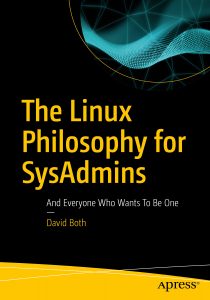
The Linux Philosophy for SysAdmins
Last Updated on August 10, 2020 by David Both

Softcover ISBN 978-1-4842-3729-8
Ebook ISBN 978-1-4842-3730-4
Apress
Amazon
Barnes and Noble
The hardcopy is available at Apress, Amazon, and Barnes and Noble.
The ebook versions are now available at Apress and Amazon.
I wrote this book to be the one I wish I had when I was starting life as a SysAdmin and before I found my own mentors.
The Linux Philosophy is an important part of what makes Linux unique and powerful. Much has been written about the Unix Philosophy which is also the basis for the Linux Philosophy. The original Unix/Linux Philosophy was intended primarily for the system developers. The developers of Unix designed it in a way that made sense to them, creating rules, guidelines, and procedural methods that worked well for system developers and that also worked for SysAdmins (System Administrators). That collection of guidance from the originators of the Unix operating system was codified in the book, “The Unix Philosophy,” by Mike Gancarz, and later updated by Mr. Gancarz as, “Linux and the Unix Philosophy.”
The original Unix and Linux Philosophy was intended for the developers of those operating systems. Although System Administrators could apply many of the tenets to their daily work, many important tenets were missing.
Over the years I have been working with Linux and Unix, I have formulated my own philosophy – one which applies more directly to the everyday life of the System Administrator. The tenets of the Linux Philosophy for SysAdmins have some basis in the original tenets of the Linux Philosophy, but however good and powerful those tenets, their origins and application can vary greatly from that of the typical SysAdmin.
This book is the result of that effort – it provides a unique hands-on approach to becoming a better SysAdmin. It is my attempt to give back to the community that nurtured me as I grew and helped me to became more confident.
The Linux Philosophy for System Administrators is not about learning new commands, processes, or procedures. Rather it is about becoming a better SysAdmin through understanding the power of Linux as a function of the philosophies that built it. SysAdmins will learn how to unleash that power with the knowledge enabled by a philosophical approach that targets their unique needs.
This book is not about learning new commands. Rather, it is about using the common and well-known commands with which you should already be familiar to illuminate the underlying structure of Linux at the command line. Think of this book and the commands you will use in the experiments like the X-rays, CT scans, and MRI’s that a doctor uses to reveal the inside of a human body. This book will show you how to use some simple Linux commands to reveal the underlying structure of GNU/Linux.
This book uses a relatively few common Linux commands to illustrate practical, usable aspects of the philosophy. Readers will learn a philosophical approach to system administration that will unlock the power of the knowledge they already have. This book will enable SysAdmins and others to more fully understand and access the vast power of the command line using commands and tools that they already know and use.
This book takes place on the Linux command line, but it is not about the commands themselves. The commands are only the tools through which the beauty of the underlying structure of Linux is revealed. This book will help you learn how to do that using the philosophy contained in its pages.